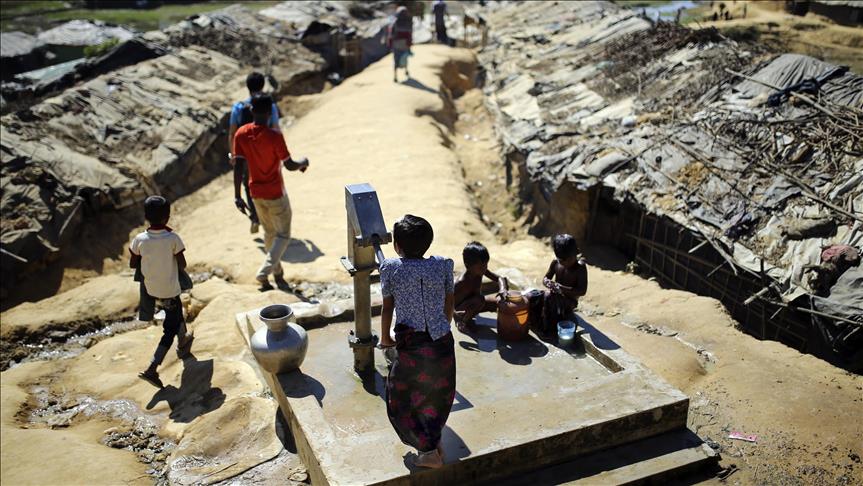Rohingya Muslims daunted by idea of return to Myanmar
Refugees in Bangladesh tell Anadolu Agency that after brutal crackdown, they have nothing left to return to in Myanmar
 Rohingya kids, who fled from oppression within ongoing military operations in Myanmar’s Rakhine state, have a bath as a girl pumps water from a handpump into a pot at a refugee camp in Cox's Bazar, Bangladesh on December 09, 2017. Rohingya children want to escape from their struggles and conflicts with playing some games or helping their families. Rohingya people demand to secure their lives in terms of security of their lives, redelivery of their belongings and their enfranchisement. Since Aug. 25, more than 650,000 Rohingya have crossed from Myanmar's western state of Rakhine into Bangladesh, according to the UN. ( Fırat Yurdakul - Anadolu Agency )
Rohingya kids, who fled from oppression within ongoing military operations in Myanmar’s Rakhine state, have a bath as a girl pumps water from a handpump into a pot at a refugee camp in Cox's Bazar, Bangladesh on December 09, 2017. Rohingya children want to escape from their struggles and conflicts with playing some games or helping their families. Rohingya people demand to secure their lives in terms of security of their lives, redelivery of their belongings and their enfranchisement. Since Aug. 25, more than 650,000 Rohingya have crossed from Myanmar's western state of Rakhine into Bangladesh, according to the UN. ( Fırat Yurdakul - Anadolu Agency )
By Tugrul Cam, Handan Kazanci
COX’S BAZAR, Bangladesh
Rohingya Muslims who have fled persecution in Myanmar and taken refuge in neighboring Bangladesh since the beginning of a brutal military crackdown in late August say the prospect of returning to Myanmar is a daunting or even impossible one.
Since Aug. 25, some 650,000 Rohingya have crossed from Myanmar's western state of Rakhine into Bangladesh, according to the UN.
The refugees are fleeing a military crackdown in which security forces and Buddhist mobs have killed men, women and children, looted homes, and torched Rohingya villages.
Speaking in camps in Bangladesh, including Balukhali, Kutupalong, and Tankhali, refugees told Anadolu Agency that they barely escaped with their lives and have nothing to return to.
A Rohingya woman named Tahara said that her husband was killed by Myanmarese soldiers and she took refuge in Bangladesh three months ago.
“Here it’s better than Myanmar. At least we’re safe here. I don’t want to return. We can protect our lives here,” she said.
Another Rohingya woman, Zubeyre, said that after her husband was stabbed to death, she had to flee to Bangladesh with her four children.
“Our only fault is being Muslim. Our only fault is praying in mosques or going to religious schools. That’s why they’re killing us,” Zubeyre said, adding that she was not planning to go back to Myanmar.
“We have nothing left there. Our house was burned. Our fields were taken from us. At least I’m safe here and can have some food,” she added.
'How will I survive?'
Shangida, a Rohingya woman who lost both her husband and her one-and-a-half-year-old son, said: “What will happen if I go back there? I don’t have my husband. I don’t have any property. My animals were killed. How will I survive there? I have nothing left there,” she said.
A vast majority of Rohingya Muslims do not have official papers in Myanmar -- either because Myanmar refused to issue any, or they left them behind when fleeing for their lives -- which would make it almost impossible for them to return under Nov. 23 deal between Myanmar and Bangladesh.
The Rohingya, described by the UN as the world's most persecuted people, have faced heightened fears of attack since dozens were killed in communal violence in 2012.
The UN has documented mass gang rapes, killings -- including of infants and young children -- brutal beatings, and disappearances committed by security personnel. In a report, UN investigators said such violations may have constituted crimes against humanity.
Anadolu Agency website contains only a portion of the news stories offered to subscribers in the AA News Broadcasting System (HAS), and in summarized form. Please contact us for subscription options.







